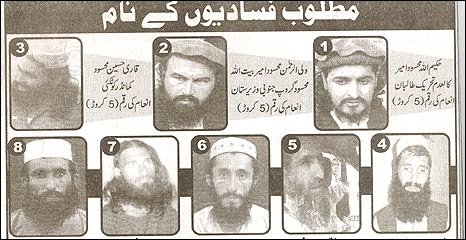|
Image may be NSFW. Clik here to view. 
|
| Eight South Waziristan Taliban commanders, pictured in a wanted poster: 1. Hakeemullah Mehsud, 2. Waliur Rehman Mehsud, 3. Qari Hussain Mehsud, 4. Azam Tariq, 5. Maulvi Azmatullah, 6. Mufti Noor Wali, 7. Asmatullah Bhittani, 8. Mohammad Anwar Gandapur. |
The Movement of the Taliban in Pakistan killed one Pakistani soldier and captured 15 more in a raid that was carried out to avenge the death of a senior commander who was killed in a US Predator airstrike in October.
A group of 35 heavily armed Taliban fighters overran a Frontier Corps fort in the settled district of Tank earlier today, according to The Associated Press. "The militants burned down buildings and captured a significant amount of weapons," AP reported.
One Frontier Corps trooper was killed and two more were wounded during the fighting. Twenty-two troops were missing after the battle, and 15 of them were later confirmed to have been captured by the Taliban. Seven others returned to the fort.
The assault was led by Asmatullah Shaheen [shown above], the Taliban's military commander in the towns of Jandola and Tank. He is better known as Asmatullah Bhittani, and has openly recruited Pakistanis to wage jihad against the US in Afghanistan. He is on the Pakistani government's list of the 20-most-wanted Taliban commanders, which was released in the fall of 2009. Since the list was released, only one commander has been killed and another has been captured.
Shaheen said that the attack in Tank was carried out to avenge the death of Taj Gul Mehsud, who was reported to have been killed along with 12 other fighters in a US airstrike on Oct. 26 (his death was not confirmed until now). Taj Gul Mehsud has been described as a senior deputy to Hakeemullah Mehsud, the leader of the Movement of the Taliban in Pakistan, which is based in Pakistan's tribal areas and the northwest.
The US has put the drone program, which hunts senior al Qaeda and Taliban leaders as well as dangerous operatives, on hold since the Nov. 26 clash with Pakistani forces in Mohmand that resulted in the deaths of 24 Pakistani troops. The last strike took place 36 days ago, on Nov. 16.
The current pause in strikes is the longest since the program was expanded in the summer of 2008. A US intelligence official told The Long War Journal that the program is "on hold" so as not to contribute to the deteriorating relations between the US and Pakistan. Officials said the pause would be broken only if a high-value target were identified, but would not say how senior the al Qaeda leader must be for another strike to occur.
